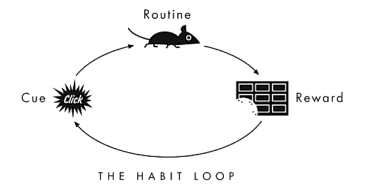Charles Duhigg has a very interesting new book called The Power of Habit: Why We Do What We Do in Life and Business.
Duhigg observes that we get through each day with assistance from any number of routines, that is, sequences of thoughts or actions that we can carry out more or less automatically once we hit the begin key. Simple acts like brushing your teeth or buttoning your shirt challenge a young child but not an adult, not because we older folks are so much more agile, but because we’ve learned to carry out these tasks without even thinking about what we’re doing.
Many of our habits are quite helpful and essential for getting through the day. But we also form other habits, to which we may pay no more attention than we do to buttoning a shirt, that can end up profoundly shaping our character or destiny. Some of these may work to our benefit, such as exercise or good nutrition, but others can be incredibly destructive, such as drug abuse, overeating, gambling addiction, or smoking.

|
Duhigg suggests that if you want to change your habits, the key is to become aware of exactly how they work. His key principle is the habit loop. There is a certain cue that sets the subsequent chain off, and then a confirmation or reward when the loop is completed. He suggests that the way to change a habit you don’t like is to become aware of the cue that sets the sequence off, and substitute another more constructive routine in place of the old. He argues that traditional addiction treatment programs such as the Twelve Steps of Alcoholics Anonymous are making use of this basic principle.
Duhigg also has a number of very interesting examples of how businesses have made use of the habit loop in successful marketing campaigns, football coaches to help their team perform better, generals to help a military campaign succeed, and a corporation to reform its character.

From the economics point of view, habits are in part about degrees of freedom. The brain is only capable of handling a certain number of open variables at a time. This is also true for societies as a whole.
Thus, there is a linkage between behavioral economics and habits at least in part through the notion of maximum degrees of freedom.
This then, is an important component of socially conservative theory. A recurrent theme in conservative thinking, going back at least to the 19th century, is the need for gradual change. So understanding the factors influencing the maximum acceptable rate of change (education, intelligence, income, wealth, risk tolerance, etc.) is potentially quite important in understanding the politically viability of a given policy prescription. Habit is likely an important determinant of the political “art of the possible”.
Jim quoted in this morning’s NYT:
http://www.nytimes.com/2012/03/04/your-money/rising-gasoline-prices-could-soon-have-economic-effects.html?_r=1&scp=1&sq=james%20hamilton&st=cse
Still not sure I understand the “innoculation theory” of oil price effects. Jim, I certainly would be interested to read a bit on the mechanics, ie, how exactly does the economy become inured to oil prices through the action of previous highs?
The delight of the shrinks!
The paradise of the hamster versus the precarious balance of freedom or more complicated the asymmetry of expectations and rewards.
Let us make it more complex, the spiritual world being polluted by the material reward an anti Manicheism version of the social behaviour.
Trivial, the world of Ivan Pavlov,cheering a world of cynics!
What was the subject the multi complex variables of energy,the oil price,the cost benefit of the prices rise in energy,the influence of the corticoids in the human body?
Sounds like another explanation for sticky price behavior. When people shop they don’t behave as utility maximizing rational agents all trying to find peanut butter, bread, milk, etc. at the lowest prices. Just look for the familiar brand that’s on a shelf within easy reach.
Has anyone applied this theory to a study of market behavior?